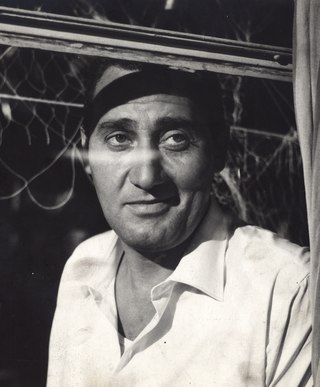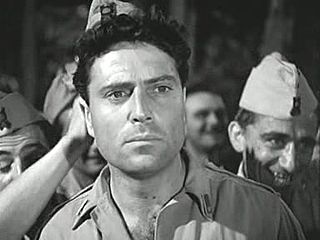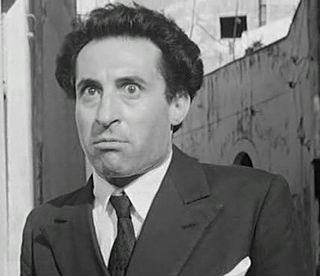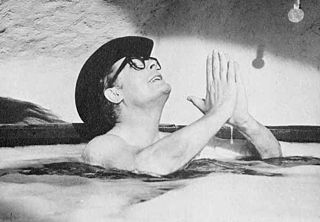Related Research Articles

Vittorio De Sica was an Italian film director and actor, a leading figure in the neorealist movement.

Alberto Sordi was an Italian actor, comedian, director, singer, and screenwriter.

Italy of Values is a populist and anti-corruption political party in Italy. The party was founded in 1998 by former Mani pulite prosecutor Antonio Di Pietro, who entered politics in 1996 and finally left the party in 2014. IdV has aimed at gathering and giving voice to different sectors of the Italian society. From the beginning of its existence one of its major issues has been the so-called "moral issue". In the early 2010s, IdV was eclipsed by the new-born Five Star Movement, founded by comedian Beppe Grillo, which used the same populist and anti-corruption rhetoric.

Rossano Brazzi was an Italian actor. He moved to Hollywood in 1948 and was propelled to international fame with his role in the English-language film Three Coins in the Fountain (1954), followed by the leading male role in David Lean's Summertime (1955), opposite Katharine Hepburn. In 1958, he played the lead as Frenchman Emile De Becque in the Rodgers and Hammerstein musical South Pacific. His other notable English-language films include The Barefoot Contessa (1954), The Story of Esther Costello (1957), opposite Joan Crawford, Count Your Blessings (1959), Light in the Piazza (1962), and The Italian Job (1969).

Massimo Serato, born Giuseppe Segato, was an Italian film actor with a career spanning over 40 years.

Raffaele Vallone was an Italian actor and footballer. One of the top male Italian stars of the 1950s and '60s, he first became known for his association with the neorealist movement, and found success in several international productions. On stage, he was closely associated with the works of Arthur Miller. He played the role of Eddie Carbone in A View from the Bridge several times, notably in Sidney Lumet's 1962 film adaptation, for which he won the David di Donatello for Best Actor.

The Italian Democratic Socialist Party, also known as Italian Social Democratic Party, was a social-democratic political party in Italy. The longest serving partner in government for Christian Democracy, the PSDI was an important force in Italian politics, before the 1990s decline in votes and members. The party's founder and longstanding leader was Giuseppe Saragat, who served as President of the Italian Republic from 1964 to 1971. Compared to the like-minded Italian Socialist Party on the centre-left, it was more centrist, but it identified with the centre-left.

Massimo Girotti was an Italian film actor whose career spanned seven decades.

Aldo Fabrizi was an Italian actor, director, screenwriter and comedian, best known for the role of the heroic priest in Roberto Rossellini's Rome, Open City and as partner of Totò in a number of successful comedies.

Giovanna Ralli,, is an Italian stage, film and television actress.

Leopoldo Trieste was an Italian actor, film director and script writer.
The Nastro d'Argento is a film award assigned each year, since 1946, by Sindacato Nazionale dei Giornalisti Cinematografici Italiani, the association of Italian film critics.

Amedeo Nazzari was an Italian actor. Nazzari was one of the leading figures of Italian classic cinema, often considered a local variant of the Australian–American star Errol Flynn. Although he emerged as a star during the Fascist era, Nazzari's popularity continued well into the post-war years.

Pietro Tordi was an Italian film actor. He appeared in 100 films between 1942 and 1988. He was born in Florence, Italy.
Gustavo Rojo Pinto was a Uruguayan-Mexican actor.

The list of the 100 Italian films to be saved was created with the aim to report "100 films that have changed the collective memory of the country between 1942 and 1978". Film preservation, or film restoration, describes a series of ongoing efforts among film historians, archivists, museums, cinematheques, and non-profit organizations to rescue decaying film stock and preserve the images they contain. In the widest sense, preservation assures that a movie will continue to exist in as close to its original form as possible.
The Nastro d'Argento is a film award assigned each year, since 1948, by Sindacato Nazionale dei Giornalisti Cinematografici Italiani, the association of Italian film critics.

Carla Calò was an Italian actress.

The Youth Front was the youth wing of the Italian Social Movement from 1971 to 1996.